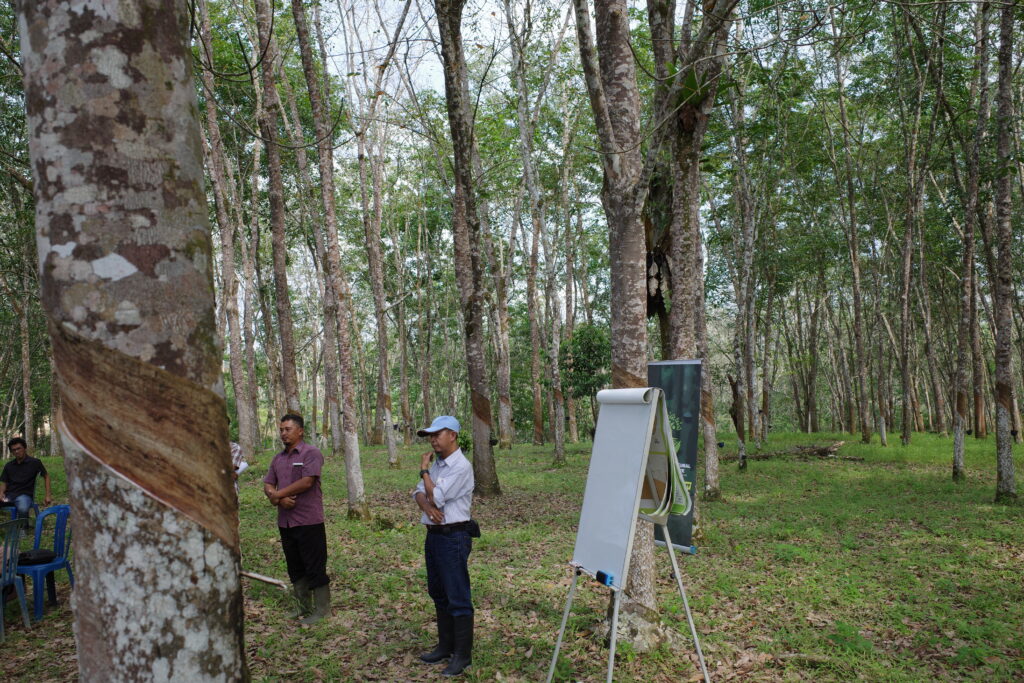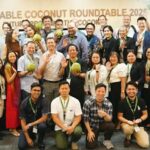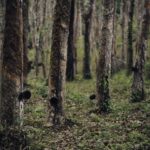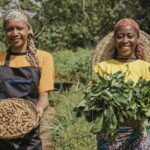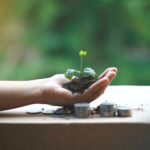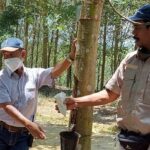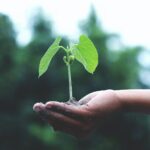Michelin & a German automaker are championing the sustainable extraction of natural rubber. The commitment of the car maker and the tire manufacturer to transparency and better working conditions in the extraction of raw materials is demonstrated by the CASCADE (Committed Actions for Smallholders Capacity Development) project. This project is the first to onboard the entirety of the supply chain: smallholder farmers and partners, a natural rubber processing company, a tire manufacturer, and a carmaker.
In this program, Ksapa, working with Local NGO Partner SETARA Jambi, is responsible for the design and deployment of capacity-building efforts using its SUTTI solution to support Sumatran rubber out growers. Capacity-building is structured around three pillars: rubber productivity, diversification and social and human rights awareness. Ksapa and Local NGO Partner SETARA Jambi have started training farmers on rubber cultivation in 2021.
In this post, Ksapa comes back on the results of a qualitative impact assessment survey conducted among farmers several months after receiving training on rubber cultivation practices.
CASCADE Project: Championing the sustainable extraction of natural rubber
Indonesia is one of the world’s most important rubber production regions. Michelin identified sustainability risks within the supply chain in rubber extraction using RubberWay, an app specially developed for this purpose and by conducting discussions with market participants. Through this risk assessment, the priority area of Jambi in Sumatra was identified as the starting point.
For manufacturers such as Michelin and its partner automaker, rubber is a key commodity as it is used in many different parts of their products. In that sense, Michelin & its partner have committed to supporting Sumatran small plantation farmers in the extraction of rubber working with Ksapa. Through capacity-building, farm diversification, and education on biodiversity, the aim is to achieve long-term improvements of Indonesian smallholders’ livelihoods.
As such, CASCADE is one of the first projects in the world to start at the first mile of the natural rubber supply chain. The scheme aims at training 1,000 smallholders by local partners to make extraction methods more environmentally compatible and efficient.
Supporting Smallholder Farmers Using Ksapa’s SUTTI Solution
Ksapa is using its SUTTI solution to calibrate and deploy CASCADE. SUTTI is a large-scale impact program that leans on a hybrid capacity-building model. We indeed combine in-person and digital solutions to boost worker training and monitor our impact in the process.
Our goal is to build durable, real-world impact at scale by:
- Delivering know-how, practice change, revenue increase, activity diversification and financial literacy to smallholders, working hand-in-hand with SETARA Jambi
- Improving and securing responsible sourcing policies.
- Strategizing performant impactful economic models to scale-up programs.
Additionally, Ksapa’s in-house SUTTI digital suite maximizes access to training via an e-learning tool and tracks program impact against social, environmental, and economic performance targets. This ultimately helps industrial groups better understand their procurement map and gives smallholders control over their farm.

CASCADE Impact: Farmer-Centric Learnings for Quick Wins
FARMER-CENTRIC METHODOLOGY FOR GREATER SATISFACTION
At its core, SUTTI is designed to empower small-scale producers to achieve greater resilience by delivering vocational training on priority topics ranging from agricultural skills to health and safety, biodiversity, etc. Training delivered is based on a thorough understanding of smallholders’ core needs. This 360-degree farmer-centric diagnosis and analysis is fundamental to the sound implementation of SUTTI projects.
Indeed, through the diagnosis phase, Ksapa identifies and classifies interventions as quick wins or mid-long-term interventions. Quick wins are actions that do not require significant time or investment to be implemented by farmers and which provide benefit in a short period of time. It is key to start the capacity-building process with quick wins building trust with farmers and then engaging more complex strategies.
The first training provided by Ksapa and its Local Partner is thus based on rubber cultivation practices quick wins. The result shown by the survey – conducted among 95% of the farmers (250) who had received training 6 months prior – is that 82% of them are satisfied or very satisfied with the training. This result must also be considered in comparison with traditional training program which usually have a satisfaction rate of 50 to 60% maximum.

UNIQUE TRAINING METHODOLOGY FOR CONCRETE IMPACTS
Ksapa’s training approach has been also praised by farmers in the survey.

Indeed, the combination of tailored training content & adequate pedagogy with e-learning capacities has proven impactful for practices adoption among farmers. By working jointly with local partners and Michelin, Ksapa was able to curate easy to understand and relevant content for farmers. Providing trainings in a hybrid format, using face-to-face and digital means, also allowed farmers to continuously delve into practices for maximum adoption.
The relevancy of the learnings provided helped farmers tackle challenges that had been left unresolved. As such, the practices disseminated had a great impact on farmers whom quickly understood the value of such trainings. As a result, 96.5% of farmers applied at least one of the practices showcased.


Farmers applying those practices had the opportunity to witness by themselves positive impacts induced after a few months. While this first training batch was focusing on rubber cultivation and productivity, we observed that farmers reported multiple impacts across different dimensions: economic, agronomic, health… This first qualitative impact study thus further proves the interest of such quick wins for farmers.

In particular, many farmers reported an improvement of the yield quickly after the training. In a specific question, 90% of farmers reported witnessing a yield increase, with a 10% increase on average. Such quick win is key to farmers as it is the first step in improving their livelihoods. Combined impact, such as increased yields with reduced usage of intrants, further improve the profitability of their farms.
Conclusion
Michelin & partners, as industry leaders, have entrusted their sustainability efforts to Ksapa and its SUTTI solution. As a key raw material in many products, the ESG performance of natural rubber supply chains must be improved. In particular, when looking at certain cultivation areas such as Jambi in Sumatra, farmers face many challenges ranging from social and economic to agronomic.
In a co-development process with local and industrial partners, Ksapa developed relevant and tailored training content to be disseminated in the CASCADE project. Delivering learnings through a hybrid methodology combining face-to-face and digital, Ksapa was eager to get feedback on its methodologies. In that sense, this first qualitative impact assessment clearly proved the case for its training methodologies and farmer-centric approach. Building upon the first impacts observed and the quick wins, Ksapa and its partners will continue to work with farmers to deliver value and impact on a broader scale.
Adrien is a SUTTI Program Officer. He’s responsible for the development, operational implementation, and monitoring of SUTTI programs. He participates in designing financial structuring schemes leveraging SUTTI’s impacts.
He has previous experiences in various industries, within public, private, and non-profit organizations. Before joining, he was involved in microfinance and social entrepreneurship initiatives in Cambodia and the Philippines, after working for Danone and RATP.
He holds a Master’s in Finance from Paris-Dauphine University, as well as a Master in Management from ESSEC Business School.
He speaks French, English, and Spanish.

